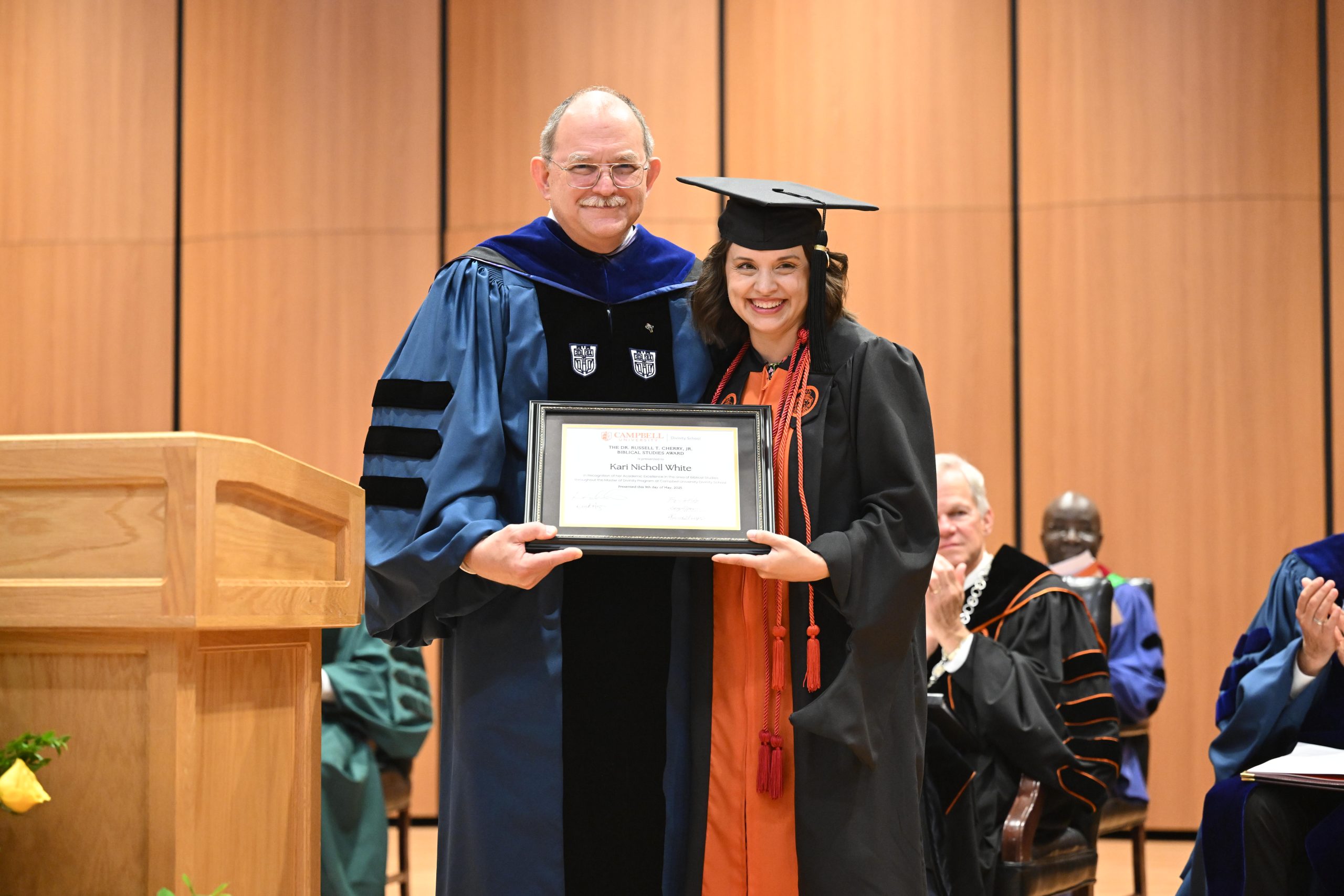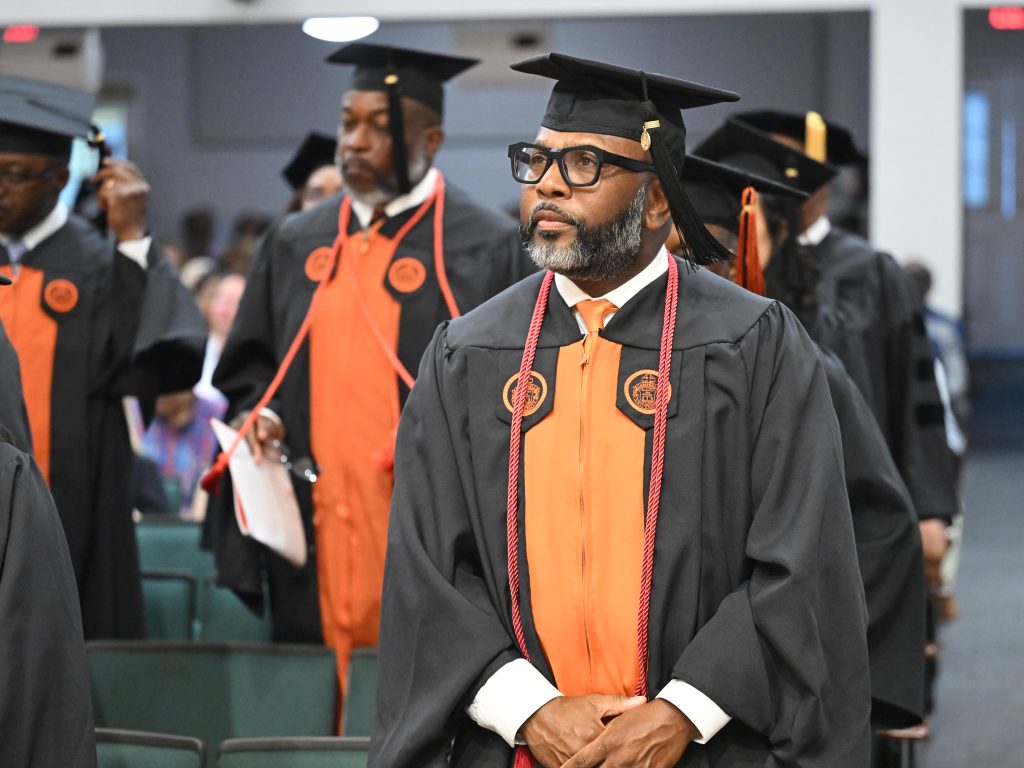On an evening celebrating new beginnings, there were several bittersweet “good byes” shared at Campbell University Divinity School’s spring commencement ceremony, held inside a packed Hobson Performance Center on Friday.

Thirty-three candidates earned their graduate degrees Friday, 25 receiving a master’s degree and eight a Doctor of Ministry. Many will begin, continue or advance in their careers in the ministry, while others — such as some who received a Master of Arts in Faith and Leadership Formation — will take their faith training to a more secular setting, such as their careers in business or higher education.
For U.S. Army Capt. Jill Marie Haram, a new Master of Divinity degree means an opportunity in her military career. Haram, who joined the Army in 2014 and served as a logistics officer in the 82nd Airborne Division, is a chaplain candidate in the Army Civil Affairs and Psychological Operations Command and will return to active duty this year. A Minnesota native, Haram has said her time at Campbell was one of growth — both in confidence and knowledge. It’s also grown her excitement to serve as a chaplain.
“Army chaplaincy has a lot of moving parts and requires a lot of training, sacrifice and dedication. Chaplains are called to nurture the living, care for the wounded and honor the fallen,” Haram recently said. “Divinity School has prepared me [for the next step] both theologically and socially.”
As the new graduates embark on their next steps, several Campbell journeys came to an end at this year’s ceremony.
Divinity School Dean Dr. Andy Wakefield and Campbell University President Dr. J. Bradley Creed both delivered welcome messages in what was their final Divinity commencement before their retirements this summer. Thirteen-year professor of New Testament and Greek Dr. Alicia Myers offered the prayer of consecration to end her final ceremony before taking on a new role at Baylor University, and Dr. Tony Cartledge, longtime professor of Old Testament at Campbell, delivered Friday’s commencement address just days before his retirement is official.

Cartledge’s speech began with a story of attending a commencement speech by his late friend (and national treasure) Fred Rogers (more widely known as Mr. Rogers). In 1995, Cartledge was a guest at Rogers’ address to North Carolina State students in Raleigh, and he began his own address Friday by echoing his charge then.
“Graduates, you have every reason to be proud tonight,” he said. “[But] you didn’t get here by yourselves. You are here because someone loved you in the beginning. You are here because someone, many someones, have supported you. Parents and grandparents, aunts and uncles, family members and friends, teachers and coaches, and others who have helped shape you to become the person you are today.”
Cartledge’s question for the graduates: “Where do you go from here?” The answer, he said, should be obvious — go after Jesus. Go with hearts and minds open to the many places Jesus may lead and walk in the way Jesus called his people to live.

But there’s more to that answer, he said. There are many differing opinions in the world on what following Jesus should mean. Cartledge was passionate in his views on what following Jesus means to him:
“The image of Jesus as a tough guy is appealing to those who think everybody has to earn their way and nobody should get anything they don’t deserve. So they’re happy taking food from the poor and medicine from the sick so the wealthy can get even more,” he said. “Jesus as a steely-eyed enforcer of anyone’s preferred social traditions is appealing to people who don’t care how much women are put at risk and how many gay or lesbian or trans people get hurt — all in the name of ‘Biblical values’ that have nothing to do with Jesus. Everything to do with the desire for power and control. He’s not the Jesus we are calling to follow. …

“We’re called to follow Jesus who loved humankind with every ounce of his being and who lived for others and called us to live as he did, giving ourselves in service to others. It may involve preaching truth on Sundays and caring for a kinder nation. … We may not have the power of Jesus to heal with a touch, but we do have the power to bring healing and hope to people who are in need. Bringing good news to the poor and proclaiming release to the captives involves more than just a personal touch. It also involves advocacy. Jesus spoke truth to power, whether it was the religious establishment of his inherent faith.”
Cartledge’s 18-minute address ended with a minute-long applause and standing ovation from much of the crowd. His ending statement: “Every day we have a chance to start over and ask that question again, ‘Where do I go from here?’ If the answer is ‘after Jesus,’ it will be a very good day.”

Notes:
- Several graduates and their families on hand Friday came from Baptist Grove Church in Raleigh. Wakefield commented that individual churches aren’t usually recognized in Campbell Divinity commencement ceremonies, “but when that church brings 30, 40 or 50 people to a ceremony, we want to recognize them.”
- President Creed was on the fourth of eight commencement and pinning ceremonies Friday, and he called the Divinity event “one of my favorites” every year, and not just because it marks the halfway point of a long weekend. “We sometimes sing at other ceremonies,” he said, “but here I get to sing hymns — hymns of faith with a community of faith. And that just thrills my soul to be able to do that.”
- Creed took off his watch during his opening statement and said his parents — both in their 90s today — gave him that watch 43 years ago when he earned his own Master of Divinity degree.
- Creed recognized Wakefield in his final commencement as dean after 15 years in the role: “I was a seminary dean at one time, and I know what a challenge it is. But I know the joys that come with it, too. … I’m thankful for the ministry and the commitment of Andy Wakefield.”
- Kari White of Des Moines, Iowa, a Master of Divinity graduate, received the Russell T. Cherry Jr. Biblical Studies Award, given to a student “grounded in faith and committed to academic study,” who digs deeply into the Biblical text and history of the church. Said Wakefield: “I think Kari may have set the record for the most biblical studies classes ever taken, including multiple semesters of Greek, Hebrew, courses in both Old and New Testament and more. She has been ordained. She has played a key role in starting a new church. And she’s raised two children. We are blessed by her lithesome spirit, passion for excellence and love for work.”





